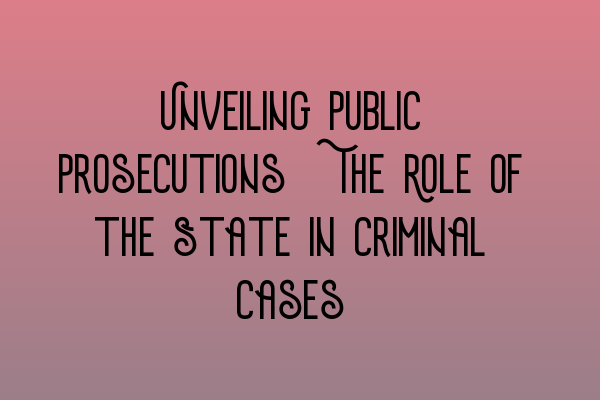Unveiling Public Prosecutions: The Role of the State in Criminal Cases
When it comes to criminal cases, the state plays a crucial role as the public prosecutor. The process of public prosecution involves the representation of the state in criminal proceedings, with the aim of maintaining law and order, upholding justice, and protecting the interests of the public.
In this article, we will delve into the intricacies of public prosecutions and the pivotal role that the state plays in ensuring a fair and just legal system.
The Duties of the State in Criminal Cases
The state, through the public prosecutor, has several key duties in criminal cases:
- Initiating and Conducting Criminal Proceedings: One of the primary responsibilities of the state is to initiate and conduct criminal proceedings. This involves investigating alleged crimes, gathering evidence, and determining whether to bring charges against an individual.
- Presentation of Evidence: The state, acting through the public prosecutor, is responsible for presenting evidence against the accused in court. The prosecutor must present a compelling case to establish guilt beyond a reasonable doubt.
- Protection of Victims and the Public: Another crucial role of the state is to protect the rights and interests of victims and the general public. The public prosecutor works to ensure that victims receive justice and that the public is safeguarded from criminal activity.
- Ensuring Procedural Fairness: The state has a duty to ensure that criminal proceedings are conducted in a fair and impartial manner. This means adhering to legal procedures, respecting the rights of the accused, and preventing any unfair advantage.
Public Prosecutors and the Criminal Justice System
Public prosecutors, also known as Crown Prosecutors in some jurisdictions, are legal professionals who represent the state in criminal cases. They work closely with law enforcement agencies and other relevant parties to build a strong case against the accused.
Public prosecutors have extensive knowledge of criminal law and procedure. They assess the strength of the evidence, determine whether charges should be brought, and guide investigations to gather further evidence if necessary.
The role of a public prosecutor is integral to the smooth functioning of the criminal justice system. They act as the voice of the state, ensuring that justice is served and protecting the interests of society.
Challenges Faced by Public Prosecutors
While public prosecutors play a vital role in criminal cases, they also face several challenges in fulfilling their duties:
- High Caseload: Public prosecutors often have a significant number of cases to handle simultaneously, which can impact their ability to devote sufficient time and resources to each case.
- Complex Legal Issues: Criminal cases can involve complex legal issues, and public prosecutors must have a comprehensive understanding of the law in order to build strong cases.
- Pressure and Scrutiny: Public prosecutors are under constant pressure to secure convictions, while also facing scrutiny from the media, defense attorneys, and the public.
Despite these challenges, public prosecutors strive to uphold justice and maintain the rule of law.
Conclusion
The state’s role in criminal cases is instrumental in ensuring a fair and just legal system. Public prosecutors, acting on behalf of the state, initiate and conduct criminal proceedings, present evidence, protect the rights of victims and the public, and uphold procedural fairness. While they face various challenges, their contribution is indispensable in upholding the principles of justice.
For more information on criminal law and practice, check out these related articles:
